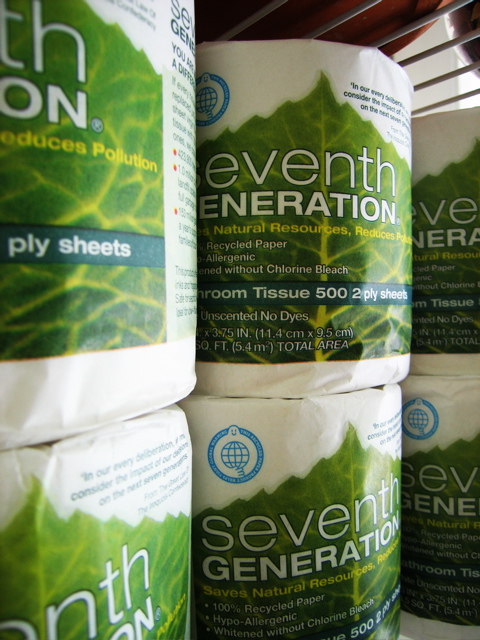Get posts by email
Greener...down the toilet
June 6, 2008
This journey to live more "green" is a process, often painfully slow. Sometimes the steps we take are large (can't think of any recent ones) but more often they are daily, small steps towards living a more earth friendly lifestyle, for lack of a better phrase.
One of this month's changes is....new toilet paper. Hardly worth mentioning but hey it's my blog and I can write about whatever I want.

Our family really appreciates trees. We hike every weekend in the mountains of Maine and never seem to get enough of the woods. The kids already understand how much humans and animals depend on trees for basic survival needs like, um, oxygen. The oceans produce a lot of oxygen as well, Laurent would pipe up if he were writing this.
So it just seems to make sense to try to use less of those virgin trees for wiping our ***es. Too bad we can't return to the good old days of outhouses and using well-read Sears catalogs and corn cobs for toilet "paper". We're trying to do second, third or maybe fourth best and use 100% (80% Post-Consumer) recycled toilet paper.
The ironic thing is that doing so costs more money. Why is making a better choice always a more costlier choice? At least initially, while there isn't enough demand. Sometimes I hate economics. For the past while we've been bumping up against the better choices cost more dilemma. And sometimes you can't choose the best for the environment or the best for your community or the best for your body because you simply can't afford to. But we are trying with each little step to move more in this direction. Which leaves us with less money for some stuff but then we realize in the end, we didn't need that stuff anyway.
Filed Under
-

rich g on June 6, 2008, 12:40 p.m.
what about the approach that advocates better forestry, so folks can continue to utilize the forests? just an early am thought.. R
-

damien on June 6, 2008, 3:14 p.m.
I am all for better forestry. Better forestry would essentially mean that we cut down less wood. Less wood means more expensive wood. More expensive wood means we use it less and probably don't use as much of it for toilet paper.
-
-

Samantha on June 6, 2008, 2:05 p.m.
I agree that the economic aspect of living a more earth-friendly lifestyle is so frustrating, it would seem that using things in the less refined, more natural state should be less expensive than the more refined or wasteful alternatives. Maybe the cost of the recycling is factored in and like you said, the demand is not high enough yet. I'm holding out hope that things will level out and even tilt in our favor in the near future as so many more people look for more natural alternatives. I love your blog and am learning so much.
-

damien on June 6, 2008, 3:27 p.m.
I think that herein lies the problem. I think we are spoiled by getting whatever we want for really cheap, where the true long-term costs have been hidden from us for so long.
The cost of purchasing a product is more than just the cost of raw materials and production. The true cost of a product is the cost of that product through it's entire life-cycle. This includes: engineering, raw materials, production, shipping, disposal, and all of the environmental costs associated with every step in the entire process. We are not used to paying for the entire life-cycle costs of a product when we purchase it, instead we leave it to our children to have to worry about the environmental costs of or our purchases. We are now paying the environmental costs from the decisions our parents made.
Paying more for products is good because it makes us think about how we want to spend our money. It makes us buy less. Buying cheap stuff at cheap prices is what is getting us into this environmental mess in the first place.
-

renee on June 6, 2008, 3:37 p.m.
Preach it Baby!
-
-
-

Amanda T. on June 6, 2008, 2:36 p.m.
Really well said Renee. I totally agree with you!
You can subscribe to comments on this article using this form.
If you have already commented on this article, you do not need to do this, as you were automatically subscribed.






Rich on June 6, 2008, 12:38 p.m.
"Too bad we can't return to the good old days of outhouses and using well-read Sears catalogs and corn cobs for toilet "paper". "
hmm one word comes to mind..
ouch